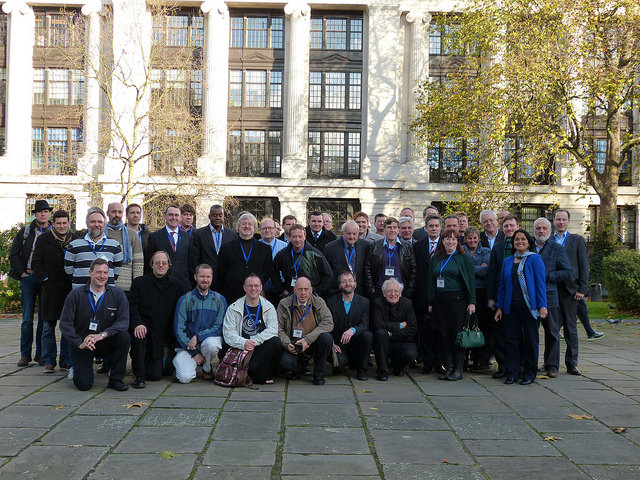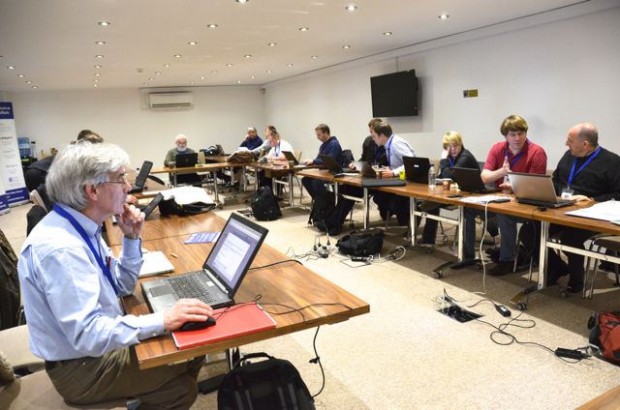In July this year, the UK government selected an open standard to use for all editable documents created by government - Open Document Format (ODF).
I blogged in November about GDS plans to host the 10th ODF Plugfest. This particular Plugfest was a chance for vendors to get together and improve their products. The goal being for users to have a better experience when they exchange documents.
Who got involved
The ODF Plugfest took place on 8-9 December. The OpenDoc Society brought together around 50 experts, representing 27 organisations, from 8 countries. There was strong support from SMEs as well as larger companies and around 15 attendees from UK government.

The youngest was a 15 year old coder from Holland. He came along with his father to work on test documents for change tracking – one of the hot topics and an essential function.
Sharing knowledge and good practice
As government workers move to modern, mobile ways of working, being able to use information across all platforms is essential. So it was great to see participants sharing information on many new initiatives - in particular for use of office apps on mobile phones, on tablets and in the browser. There is already a variety of software and applications for use on all platforms and the choice is growing.
We heard from the Dutch government about the technology it uses to publish its official documents. These come in many formats - for web browsers (HTML), for easy reuse in office documents (ODF) and for print (PDF). These are all derived from a single XML file which is also published to meet other processing needs.
We also saw a demonstration of a working solution across both browser and office applications that fulfills the need to share provenance data for embedded media objects. This used an RDFa mechanism that is part of the ODF 1.2 specification and is a feature that can support many other interesting use cases.
We heard there is an update to officeshots.org. This is a browser based tool that enables users to see what their documents look like in different products implementing the ODF standard.
Coding and testing
The Plugfest attendees officially adopted a new testing paradigm, Autotests. An ODF expert working for the Ministry of the Interior of the Netherlands, Jos van den Oever, proposed the test methodology. An open source toolkit accompanies it and enables coders to quickly generate test documents across multiple versions of the ODF standard.
These new tests and methodologies will enable collaboration between developers in different countries, working on different tools. As they add more tests, the results could show consumers the product improvements and the implementation of which features in which products. This could help them choose the best software to meets their needs.
During the Plugfest, there was particular focus on generating test documents for text styling, change tracking interoperability, RDFa and XForms.
The current change tracking mechanism described in the standard works well in practice. Change tracking is a popular feature for government users, so we are keen to see the thorough testing of these implementations.
The great thing about using an open standard, such as ODF, is that everything is out in the open. Implementers can test in a clear and precise way. The test documents created during the Plugfest will help us see if features described in the standard work exactly as a user would expect.
Feeding back to the standard committee
It isn't just testing that happens at a Plugfest. The event is one of the valuable occasions where users, such as government employees, can meet up with developers and researchers from around the world who work together to create the standard we all use.
We heard from members of the ODF Technical Committee about the work they’re doing on upcoming features for the next version of the standard. For instance, for collaboration on documents in real time across different platforms so that more than one person at a time can edit.
Attendees at the Plugfest are also feeding back to the Technical Committee. They’re asking for minor updates to the current version of the ODF standard to accommodate some pressing needs of both users and implementers, including for extra track changes features.
11th ODF Plugfest
It was clear to me that the ODF community has renewed energy. The work of the coders and testers will continue until the Plugfest reconvenes in the summer of next year when the Dutch Forum Standaardisatie has kindly offered to host the event. We’ll be meeting then to continue making things better for people who use office productivity tools.
Follow Linda on Twitter and don’t forget to follow the Government Technology blog.

